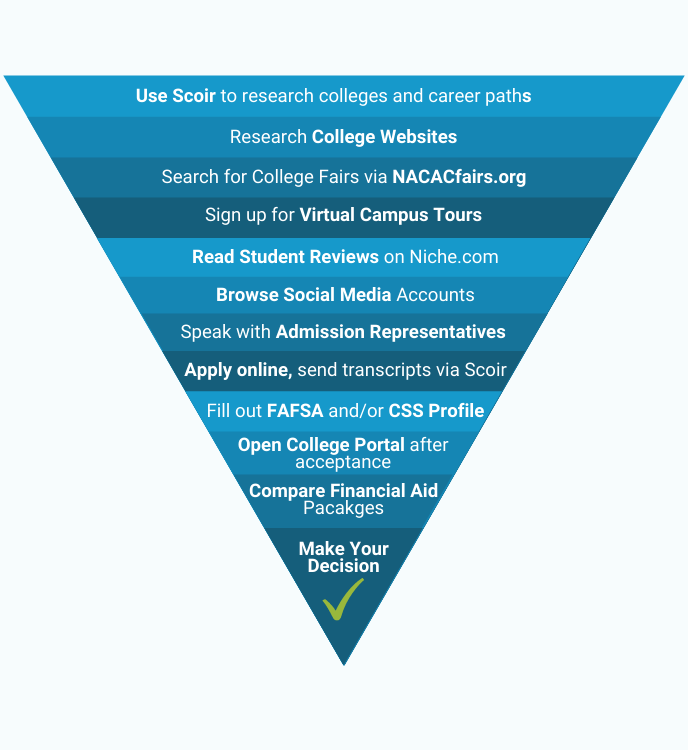2 min read
Top 3 Benefits of the Scoir Counselor Collective
The Scoir Counselor Collective was created for you—school counselors looking to strengthen their network and build community among each other. As...
Free for students & their families
Seamlessly integrated, affordable systems for use across your district.
Career Readiness for 6-8 grade, built to guide and track progress in the early years of career exploration.
Scoir + Common App are integrated for the 2025-26 academic year!
Check out content and practical guides to help inform your enrollment strategies and programs.

Thanks to ingenious virtual resources, you can access the information you need to continue your college journey without ever leaving home. Here are the resources and a systematic approach I recommend to all of my students who are planning to attend college.
I'll cover the following:
If you're beginning the college search process and your high school uses Scoir, I suggest you utilize Scoir's offering of PrinciplesYou. Through a series of unique assessments, PrinciplesYou offers the opportunity to zero in on your strengths and possible career paths.
If you're looking to learn more about bringing PrinciplesYou to the classroom and helping students make the most out of their results, consider signing up for the PrinciplesYou Certification for Counselors through Scoir U.
Be sure to take our Career Interest Assessment and College Match Quiz as well! These quizzes are available regardless of whether your high school uses Scoir.
Once you have an idea of what you'd like to pursue, I recommend you begin researching colleges with Scoir.
Lack of funds, time, transportation, and other factors may keep you from visiting colleges and meeting with college representatives in person; however, you can conduct a systematic college search virtually. Be sure to take notes during the entire search.

It's critical to read about your intended major in the academics section of each university you're interested in. I also suggest you search for the 4-year graduation plan including courses needed to complete the Bachelor’s Degree. Seek a digital copy of the course catalog, or inquire about obtaining a copy.
Keep an eye out for virtual student panels, admissions information sessions, and professor talks in your field of interest, either on Scoir or the college website. Most colleges know how often you attended sessions, disclosing your level of interest.
In addition to searching for virtual college sessions on Scoir, I also recommend keeping an eye out for regional or national college fairs.
A virtual tour is one more way to become familiar with a college. Does the information you have researched thus far match what you are seeing in the virtual fair? Write down questions that may arise during the tour and connect with a representative after the tour to have your questions answered.
Social media is used to communicate with potential applicants about what their school offers. Seek school-sponsored media on Instagram, X, YouTube, TikTok, Facebook, and Snapchat. Follow the account to receive up-to-date information. Be aware of your account and ensure it is appropriate for the colleges to view. Use chat boxes, live chat, and Zoom calls to get answers to your specific questions. If you're nervous, write down your questions before the Zoom call.
I can't stress enough how important it is for you to know and communicate with the representative who works with your high school. If it is one of your top three colleges, you should be in contact with the rep. Locate their name and email on the college admissions website. If you cannot find it, call admissions. Introduce yourself to the rep via email and attach your College resume. Ask questions based on your research. If the answer can be found on the website, it should not be asked in the email. Write in full sentences and thank them for their time.
If you have an opportunity for a virtual college interview, definitely take it!
Missing out on those opportunities for in-person visits, college fairs, and meetings certainly makes the process of researching college a challenge. However, it's not cause to stop the process altogether.
When you're ready to begin your application process, jump over to this blog for our tips on how to prepare a stellar application.
This article was originally published on December 1, 2020. It was updated on July 22, 2024 for accuracy and comprehensiveness.

Julie Kampschroeder has over three decades of experience working with high school students. She is passionate about assisting first-generation and low-income college-bound students. Julie worked in a diverse high school in St. Louis, Missouri. Early in her career, she volunteered countless hours with the Missouri Association of College Admission Counselors (MOACAC) and earned both the President’s Service Award (2008) and Peggy Clinton Lifetime Service Award (2012). As a first-generation college student herself, growing up in a small town, she is most proud of the National Association of Admissions Counselor Inclusion, Access, and Success Award (2013). Maya Angelo’s motto of “when you know better, you do better” guides her work in educating first-generation students to level the playing field in college admissions.

2 min read
The Scoir Counselor Collective was created for you—school counselors looking to strengthen their network and build community among each other. As...

4 min read
We recently published a podcast episode on this topic. This blog post provides a recap of what we covered during the episode. Hi! It’s Abby from...

6 min read
Gaining admission to the college(s) of your choice might weigh heavily on your mind at the moment. The odds are that the prospect of affording...